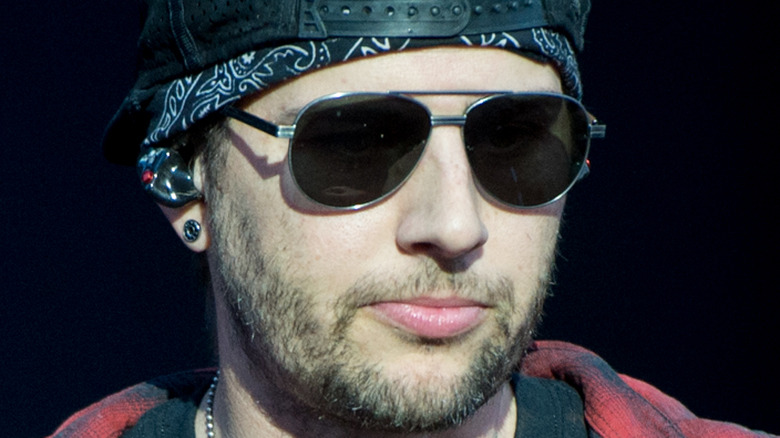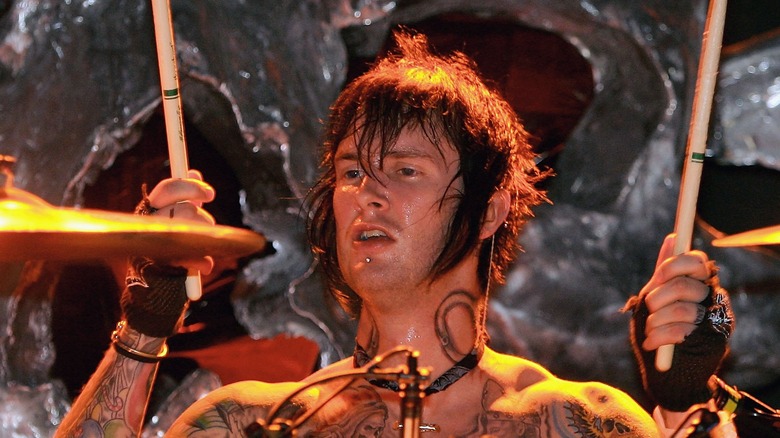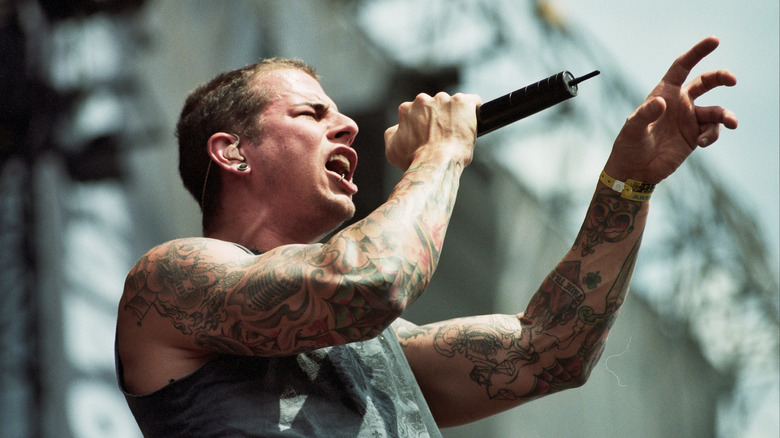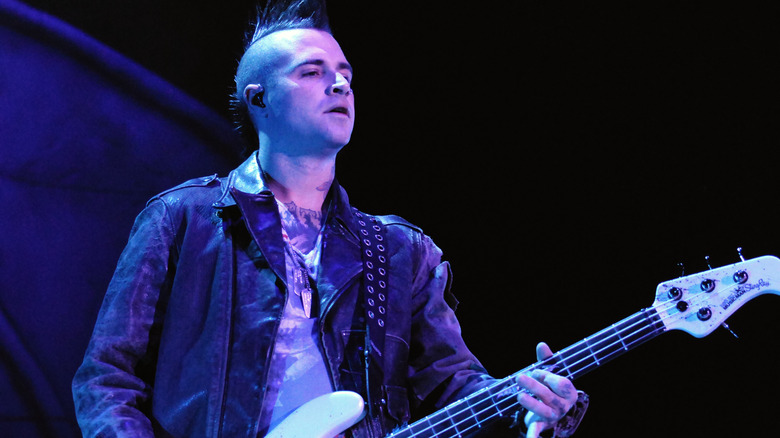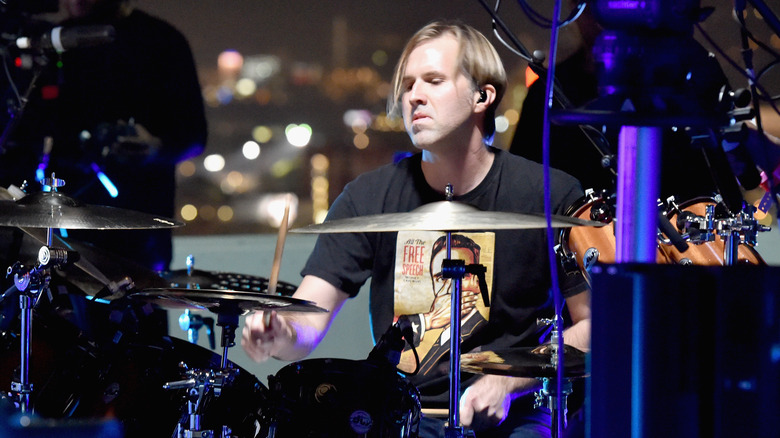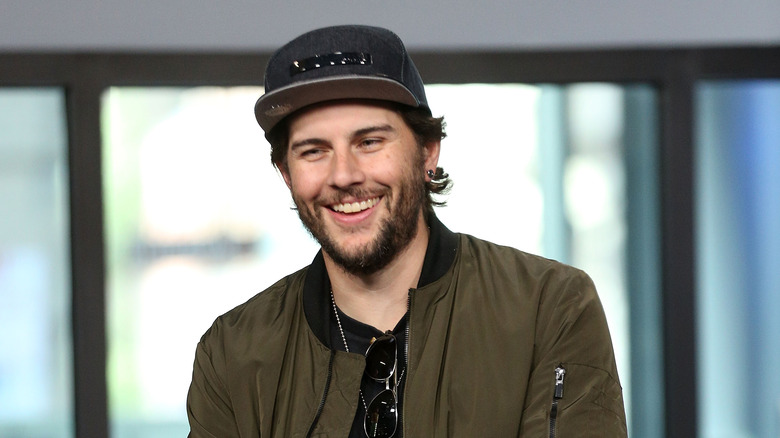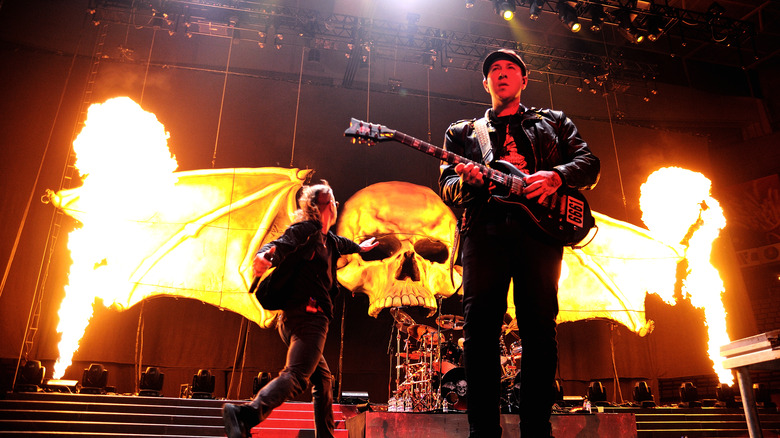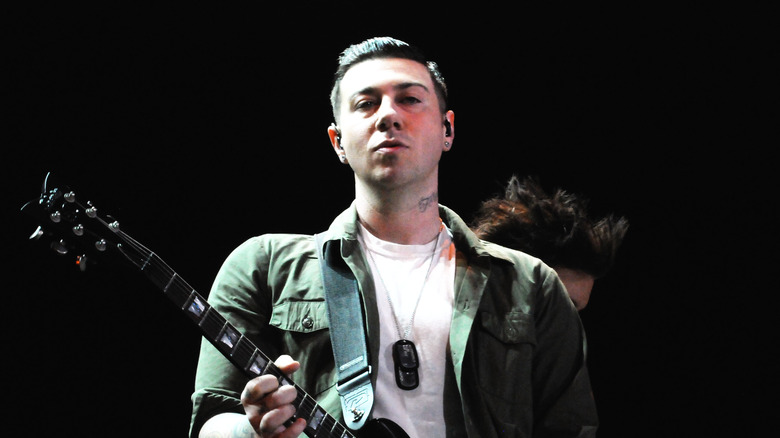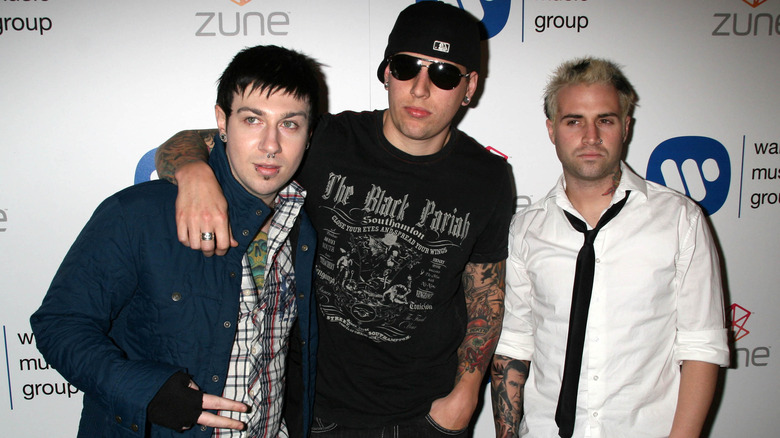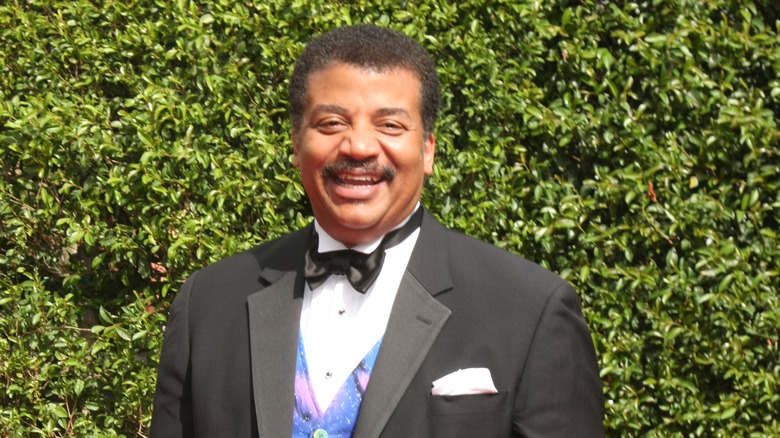The Untold Truth Of Avenged Sevenfold
"I'm too weird to live but much too rare to die." Who knew that a famous Raoul Duke quote from "Fear and Loathing in Las Vegas" would be the heart and soul of 2005's "Bat Country," Avenged Sevenfold's first single to go gold (via RIAA) and the track that catapulted the Californian rockers to headline superstars? It was a long time in the making, however, as the band started way back in 1999 when the original members were still in high school (via AllMusic). As they hit the road and recorded their music, they experimented with and fused different styles — starting off as a metalcore band with 2001's "Sounding the Seventh Trumpet" and evolving into a progressive metal outfit in 2016's "The Stage."
Despite their success and critical acclaim (Loudwire deemed them one of the top 50 metal bands of all time), their rise to the top hasn't been without its various trials and tribulations. From losing their drummer and best friend Jimmy "The Rev" Sullivan to a lawsuit brought upon them by their former record label, these are the moments that changed the trajectory of A7X forever. So let's put on "Hail to the King," turn up the dial to 11, and find out more about the untold truth of Avenged Sevenfold.
Avenged Sevenfold wanted to break up after The Rev's passing
In December 2009, Avenged Sevenfold's drummer and backing vocalist Jimmy "The Rev" Sullivan passed away from an accidental overdose, as per a Rolling Stone report. At 28 years of age, The Rev's untimely death shocked his family and friends as his musical career was only getting started, and it ended so abruptly. For his bandmates, it almost proved to be too much as they contemplated closing the chapter on A7X once and for all.
"After Jimmy died, we were f***ing done," Synyster Gates told Kerrang. "For the first week, we were done. We all sat down and said, 'We gotta throw in the towel, without Jimmy, there is no Avenged Sevenfold.' But when we sat and talked with Jimmy's family, they were like, 'You guys have gotta do this.'" He added that the Sullivan family encouraged the band to continue since they believed it would be something that The Rev would have wanted them to do. Gates revealed that it was difficult to do so initially, but the band was glad that the people around them pushed them forward.
If you or anyone you know is struggling with addiction issues, help is available. Visit the Substance Abuse and Mental Health Services Administration website or contact SAMHSA's National Helpline at 1-800-662-HELP (4357).
Warner Bros. sued the band
For over 10 years, Avenged Sevenfold called Warner Bros. their home. The band released four albums — "City of Evil," "Avenged Sevenfold," "Nightmare," and "Hail to the King" — claiming two Billboard 200 chart-topping records in this period. Somewhere along the line, though, the relationship soured, and A7X informed Warner Bros. that they would not be working with the label any further at the end of 2015. So what did the execs do? Did they reach out to one of their most successful rock acts and try to resolve the issue in an amicable way? Nope, they sued the band, as per an exclusive Billboard news report.
According to a statement released by Avenged Sevenfold's attorney Howard E. King (via Blabbermouth), the band wanted to use the seven-year statute law to terminate their deal with Warner Bros. The group cited that there had been many changes at the label since they had signed, and they no longer had a relationship with the A&R personnel. The lawsuit went back and forth for several years; however, according to Johnny Christ's comments on his podcast "Drinks with Johnny" in 2020, it appears as if Avenged Sevenfold is back at Warner Bros. once again.
Avenged Sevenfold wasn't happy to be caught up in Dream Theater's drama
Band drama. Who doesn't love a little bit of those shenanigans? Turns out that Avenged Sevenfold aren't about that life, preferring to keep the drama to "Days of Our Lives" and Blabbermouth's comments section. In 2010, the band was unintentionally caught up in the messy split between their former session drummer Mike Portnoy and his band Dream Theater. Portnoy had stepped in to complete the drum tracks for the "Nightmare" album after the passing of The Rev, though he was never made a permanent member of A7X.
According to an interview that Zacky Vengeance had with the radio station 107.7 The Bone (via Loudwire), Avenged Sevenfold told Portnoy from the beginning that the gig was only temporary since they weren't ready to find a full-time replacement for The Rev at the time. However, they were made aware by Portnoy that he was considering leaving Dream Theater. Vengeance admitted that the band was taken aback when Portnoy told them that he quit Dream Theater, announced it on social media, and was ready to join them full time. The band reminded him that wasn't what was agreed upon, then had to watch on as Portnoy and Dream Theater publicly feuded. The drama aside, Vengeance said Avenged Sevenfold would always be grateful to Portnoy for helping the band out when they needed him.
The band thought it was weird that they appeared on TRL
There was a time when the "M" in "MTV" stood for "music," and the channel actually played music and featured bands. One of the most popular shows on MTV at the time was "Total Request Live," or "TRL," where the most requested music videos by fans would be played on air. Initially hosted by Carson Daly, it was a big deal to get featured on "TRL," and it helped legitimize many bands in the mainstream's eyes. By 2005, it was almost unheard of for heavier bands to feature on the show, as the top hits of the year were more of the poppier or R&B variety.
So imagine how Avenged Sevenfold must have felt when "Bat Country" flapped its way to the top of the "TRL" charts. Speaking to MTV, M. Shadows admitted it was a strange feeling. "When we even heard that we were being announced on 'TRL,' I think we were just like, 'That's kinda weird,'" he said. "But it was a decision we had to make: Do we wanna go that route and do that? But it's a very tough market to sell CDs and get people to hear you, so we were just excited to be No.1." "TRL" disappeared from MTV in 2008.
M. Shadows worked with Axl Rose and Chris Cornell's vocal coach
Fans who picked up 2003's "Waking the Fallen" and 2005's "City of Evil" would have immediately noticed not only the difference in the musical approach but also in M. Shadows' vocal style. While it wasn't like he'd gone from belting out "Raining Blood" to "MMMBop," there was certainly a shift as he moved away from screaming to singing. As Shadows revealed to Blistering, the change was entirely intentional since the band had no intention of releasing a similar-sounding album again.
The Avenged Sevenfold singer went under the tutelage of vocal coach Ron Anderson — who worked with Axl Rose and Chris Cornell — for nine months before entering the studio. "You hear Scott Weiland, Axl Rose, or Chris Cornell, and they all have that high distorted, gritty, whiny low range," Shadows told Blistering. "Ron taught me how to have that grit to my voice while still having the tone. He brought all of that to the table, and he brought that technique to my voice." Shadows also wasn't too concerned if fans accused him of selling out since he believed this singing change was necessary for the evolution of the band and its sound.
A7X keeps politics out of their music
Most bands that have roots in the hardcore scene are political. They aren't afraid of airing their views on various topics and showing their audience which side of the fence they are on. According to M. Shadows, however, Avenged Sevenfold prefers to keep their personal political views out of their music since they believe the messages often get taken out of context and create more dissension in the fanbase.
In an interview with Rock 106.9 (via Blabbermouth), Shadows said, "I would consider myself pretty political, but I try to keep it out of the music, because I just know that every soundbite you'll get from me in a radio interview or a magazine, then there can always be a counter-argument which I'll never be able to [give a] rebuttal to." That said, Shadows publicly supported the Black Lives Matter movement and told Kerrang that he felt it was essential for him to show his support for the cause (his band backed him, too).
Why Brooks Wackerman left Bad Religion for A7X
It took a while after The Rev's passing for Avenged Sevenfold to decide on a permanent drummer. Arin Ilejay joined the band in 2011, but he was let go in 2015 (via Louder). Not long afterward, Bad Religion's Brooks Wackerman was announced as the new man behind the drum kit. It surprised many people in the music industry, especially since Wackerman had been with the legendary punk band for 14 years when he quit to join A7X. So why did he decide to put in his notice?
In a conversation with Drum Magazine, Wackerman revealed the simple and highly relatable reason. "At the time when the Avenged guys asked me to join, I was looking for a different style, or at least a new adventure," he said. "They were familiar with my work, so I was honored they even asked me." Wackerman added that his drum idols were all hard rock and metal drummers, so joining Avenged Sevenfold was something of a return to his roots. He might have made a name for himself in the punk scene, but metal was always number one in his heart.
Online hate doesn't faze the band
Being a part of the rock and metal community is the equivalent of throwing a brick up into the air and trying to catch it. Sometimes it'll land in your hands without incident, while occasionally, it'll hit you square in the face and have you wondering why you threw it in the first place. Having been around the block for over two decades now, Avenged Sevenfold understands the volatility of rock and metal fans, especially on online forums and social media platforms where comments often degenerate into elitist arguments and verbal mudslinging about tastes.
Answering fan questions for Metal Hammer, M. Shadows said that the online criticism doesn't bother the band at all. "The Internet lost its bite many years ago for me," he explained. "You can go on any artist's YouTube channel or Facebook and copy and paste the comments. 'New stuff sucks' or 'I'm disappointed,' blah, blah, blah ... Who cares?" Shadows revealed that he doesn't let the praise dictate his mood either, suggesting that people shouldn't be too concerned about what others say or think about them in general. In other words, don't take the Internet too seriously because it's full of nonsense.
The band is into the NFT market
For better or worse, non-fungible tokens, better known as NFTs, have become a major part of the online space and discourse. Many artists have experimented with these digital assets to varying degrees of success. Toward the end of 2021, Avenged Sevenfold tested the waters in the market by releasing 10,000 NFTs through the Deathbats Club to their fans (via Forbes).
"We were getting pretty deep into collecting CryptoPunks, and we decided to do an NFT that we released before the Deathbats Club," M. Shadows told Forbes, "which was us kind of dipping our toes into the waters and seeing how the fanbase was going to react to it." Shadows acknowledged that the NFT market can be confusing and not necessarily for everyone, but the band is prepared to educate the fans that want to be educated about it. He added that he hopes that on-chain releases of music become the way of the future since he believes the old way of releasing music through a label is now dated.
Zacky Vengeance says he never took a guitar lesson
Regardless of what anyone thinks of Avenged Sevenfold's music, no one can deny that Zacky Vengeance and Synyster Gates' guitar playing is impressive. The dual axemen sweep the melodies through their galloping riffs and lightning-speed solos as they ensure that the guitar is the central instrument to every A7X song. While Gates studied different genres at Hollywood's Musicians Institute and learned a few tricks from his musician father, Brian Haner Sr. (via Synner), Vengeance doesn't have any formalized training.
"I've never taken a guitar lesson in my life," Vengeance revealed to GoetiaMedia. "I never cared about any of that. I just care about music, and I care about the way that it makes me feel." Vengeance added that he has never seen himself as one of the great guitar players, no matter how much praise he receives from others, stating that the reason he picked up his guitar in the first place was because of his love of music. Talk about being born with it.
Avenged Sevenfold doesn't care about industry metrics
Much like the box office receipts tell a studio if a film is successful or not, the sales charts are all that record labels care about. These are the numbers that executives pore over and want to see in their boardroom meetings, as they show if an album has been a good investment for them. Despite having two albums hit the top spot in the Billboard 200, M. Shadows told Metal Hammer that Avenged Sevenfold aren't looking at the charts to validate what they're doing.
The A7X vocalist revealed that "The Stage" remains his favorite album to date, even if it isn't the top-selling record. The surprise release debuted at No. 4 on the Billboard 200, which was three positions lower than its predecessors "Hail to the King" and "Nightmare." Shadows declared that the band stood by their decision to drop the surprise album without any marketing and weren't too concerned about the numbers. Additionally, he said that after their next release, they would have no label and are looking forward to the freedom to experiment and connect directly with the fans.
Neil DeGrasse Tyson suggested the band make their track Exist shorter
One of the most eclectic tracks off "The Stage" is the finale "Exist," which is narrated by renowned astrophysicist and science personality Neil deGrasse Tyson and centered on the Big Bang phenomenon (via Rolling Stone). It was also the band's longest track, clocking in at 15 minutes and 41 seconds, which is probably longer than some grindcore albums. As it turns out, Tyson had some thoughts on the song's radical length and voiced his concerns, as M. Shadows revealed to Loudwire.
"He's like, 'Are you sure you want to do a 15-minute song? You know, 'Imagine' by John Lennon is very simple,'" Shadows said. "And I was like, 'We got the music part, dude, trust me. This is going to be cool.' And he's like, 'Okay, as long as you really want three minutes of me talking.'" Considering how the likes of Metal Injection and NME gushed about the experimental Avenged Sevenfold album and reserved special praise for the track, it's clear that Shadows knew what he was talking about from the start, and Neil deGrasse Tyson was wrong. Who'd a thunk it?
